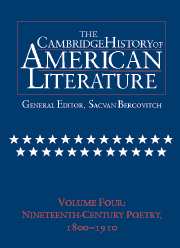1 - Neoclassicism: comic and satiric verse
from AMERICAN VERSE TRADITIONS, 1800–1855
Published online by Cambridge University Press: 28 March 2008
Summary
The architecture of the Federal period is still admired in the United States; the prose of the Founding Fathers is widely praised as the best the country has ever produced. But the poetry that was part of the same culture has come to seem more alien than the neo-Latin poetry of the Puritans. The high gloss and urbanity of neoclassical verse seems inherently at odds with the prosaic realities of American life. Yet the poets who were writing neoclassical poetry at the turn of the nineteenth century were quite inventive in shaping imported conventions to fit their own purposes. The radiant self-satisfaction that beams through every couplet of Barlow's ten-book Columbiad will not attain such intensity again until the first edition of Leaves of Grass, and the reader who wants to understand Whitman's rewriting of European tradition would do well to examine Barlow's epic first.
Behind the enduring appeal of neoclassical conventions in the United States lay an educational system still devoted to the study of classical languages and literatures. When the hero of Washington Allston's novella The Hypochondriac wickedly suggested that the only reason people profess to value the classics is that they refuse to admit that their educations have been thrown away, he was assuming such an identification, which lasted well into the nineteenth century. Admission to a college demanded a reading knowledge of Latin and Greek, and the first two years of study were largely taken up with linguistic exercises. Such an education was very far from worthless to men who wished to take part in public affairs, where writing and speaking with power were still necessary skills.
- Type
- Chapter
- Information
- The Cambridge History of American Literature , pp. 17 - 40Publisher: Cambridge University PressPrint publication year: 2004

